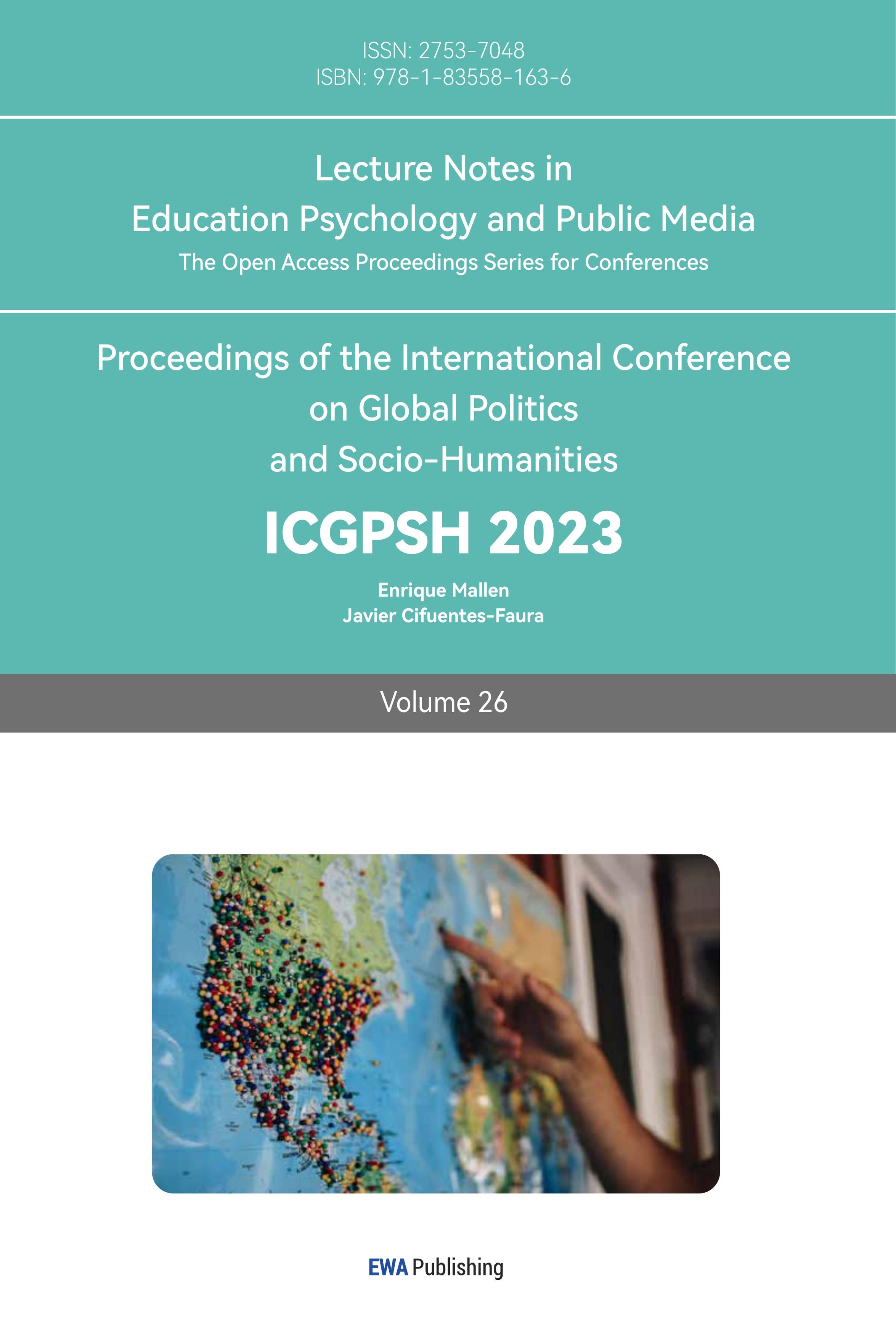References
[1]. Niu, M., Zhang, Y., & Zhou, J. Survey on the use of electronic devices among children aged 1-3 in Shanghai [J]. Shanghai Education Research, 2018(2), 56-60.
[2]. Prensky, M. Digital natives, digital immigrants part 2: Do they really think differently? [J]. On the horizon, 2001, 9(6), 1-6.
[3]. Dong, C., Cao, S., Li, H. Young children’s online learning during COVID-19 pandemic: Chinese parents’ beliefs and attitudes [J]. Children and Youth Services Review, 2020, 118, 105440.
[4]. Cao, S., & Li, H. The impact of early digital device use experiences on young children's executive functions: Progress and policy implications from brain and cognition research [J]. Early Childhood Development, 2022(04), 5-15.
[5]. Peng, D. General Psychology [M]. Beijing: Beijing Normal University Press, 2019.
[6]. Zhai, J., Chen, Y., & Wang, X. Mobile devices promote children's learning in outdoor natural environments: A systematic analysis based on empirical research abroad [J]. Modern Distance Education, 2021(05), 43-51. DOI:10.13927/j.cnki.yuan.20211002.003.
[7]. Wang, Y., & Chen, Z. Cognitive and language characteristics of children with Williams syndrome and rehabilitation implications [J]. Chinese Journal of Rehabilitation Medicine, 2023, 38(04), 561-566.
[8]. Zhu, Y. Research on the current situation of the use of educational apps by preschool children in rural areas of China [D]. Huazhong Normal University, 2020. DOI:10.27159/d.cnki.ghzsu.2020.001831.
[9]. Chen, J., & Jiang, R. Expert research findings: Screen exposure has multiple impacts on early childhood development [EB/OL]. 2022-06-07. https://news.sciencenet.cn/htmlnews/2022/6/480518.shtm.
[10]. Marc Palaus, Raquel Viejo-Sobera, Diego Redolar-Ripoll, Elena M Marrón. Cognitive Enhancement via Neuromodulation and Video Games: Synergistic Effects? [J]. Front Hum Neurosci. 2020 Jun 19;14:235. doi: 10.3389/fnhum.2020.00235. eCollection 2020.
Cite this article
Huang,S. (2023). Impact of Children's Digital Device Usage on Their Cognitive Function: A Comprehensive Literature Analysis. Lecture Notes in Education Psychology and Public Media,26,137-142.
Data availability
The datasets used and/or analyzed during the current study will be available from the authors upon reasonable request.
Disclaimer/Publisher's Note
The statements, opinions and data contained in all publications are solely those of the individual author(s) and contributor(s) and not of EWA Publishing and/or the editor(s). EWA Publishing and/or the editor(s) disclaim responsibility for any injury to people or property resulting from any ideas, methods, instructions or products referred to in the content.
About volume
Volume title: Proceedings of the International Conference on Global Politics and Socio-Humanities
© 2024 by the author(s). Licensee EWA Publishing, Oxford, UK. This article is an open access article distributed under the terms and
conditions of the Creative Commons Attribution (CC BY) license. Authors who
publish this series agree to the following terms:
1. Authors retain copyright and grant the series right of first publication with the work simultaneously licensed under a Creative Commons
Attribution License that allows others to share the work with an acknowledgment of the work's authorship and initial publication in this
series.
2. Authors are able to enter into separate, additional contractual arrangements for the non-exclusive distribution of the series's published
version of the work (e.g., post it to an institutional repository or publish it in a book), with an acknowledgment of its initial
publication in this series.
3. Authors are permitted and encouraged to post their work online (e.g., in institutional repositories or on their website) prior to and
during the submission process, as it can lead to productive exchanges, as well as earlier and greater citation of published work (See
Open access policy for details).
References
[1]. Niu, M., Zhang, Y., & Zhou, J. Survey on the use of electronic devices among children aged 1-3 in Shanghai [J]. Shanghai Education Research, 2018(2), 56-60.
[2]. Prensky, M. Digital natives, digital immigrants part 2: Do they really think differently? [J]. On the horizon, 2001, 9(6), 1-6.
[3]. Dong, C., Cao, S., Li, H. Young children’s online learning during COVID-19 pandemic: Chinese parents’ beliefs and attitudes [J]. Children and Youth Services Review, 2020, 118, 105440.
[4]. Cao, S., & Li, H. The impact of early digital device use experiences on young children's executive functions: Progress and policy implications from brain and cognition research [J]. Early Childhood Development, 2022(04), 5-15.
[5]. Peng, D. General Psychology [M]. Beijing: Beijing Normal University Press, 2019.
[6]. Zhai, J., Chen, Y., & Wang, X. Mobile devices promote children's learning in outdoor natural environments: A systematic analysis based on empirical research abroad [J]. Modern Distance Education, 2021(05), 43-51. DOI:10.13927/j.cnki.yuan.20211002.003.
[7]. Wang, Y., & Chen, Z. Cognitive and language characteristics of children with Williams syndrome and rehabilitation implications [J]. Chinese Journal of Rehabilitation Medicine, 2023, 38(04), 561-566.
[8]. Zhu, Y. Research on the current situation of the use of educational apps by preschool children in rural areas of China [D]. Huazhong Normal University, 2020. DOI:10.27159/d.cnki.ghzsu.2020.001831.
[9]. Chen, J., & Jiang, R. Expert research findings: Screen exposure has multiple impacts on early childhood development [EB/OL]. 2022-06-07. https://news.sciencenet.cn/htmlnews/2022/6/480518.shtm.
[10]. Marc Palaus, Raquel Viejo-Sobera, Diego Redolar-Ripoll, Elena M Marrón. Cognitive Enhancement via Neuromodulation and Video Games: Synergistic Effects? [J]. Front Hum Neurosci. 2020 Jun 19;14:235. doi: 10.3389/fnhum.2020.00235. eCollection 2020.









